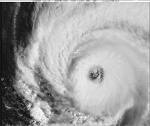Scientists at University of Wisconsin-Madison and the National Climatic Data Center (NCDC) of the National Oceanic and Atmospheric Administration reported the finding in the journal Geophysical Research Letters.
“The debate is not about scientific methods, but instead centers around the quality of hurricane data,” says lead author James Kossin, a research scientist at UW-Madison’s Cooperative Institute for Meteorological Satellite Studies. Kossin and his colleagues had to smooth out the data before exploring interplay between warmer temperatures and hurricane activity, essentially simplifying newer satellite information to align it with older records.
Sea-surface temperatures may be why greenhouse gases are exacting a unique toll on the Atlantic Ocean, says Kossin. Hurricanes need temperatures of around 27 degrees Celsius (81 degrees Fahrenheit) to gather steam. On average, the Atlantic’s surface is slightly colder than that but other oceans, such as the Western Pacific, are naturally much warmer.
Subscribe to our newsletter
Stay up to date with DeSmog news and alerts







